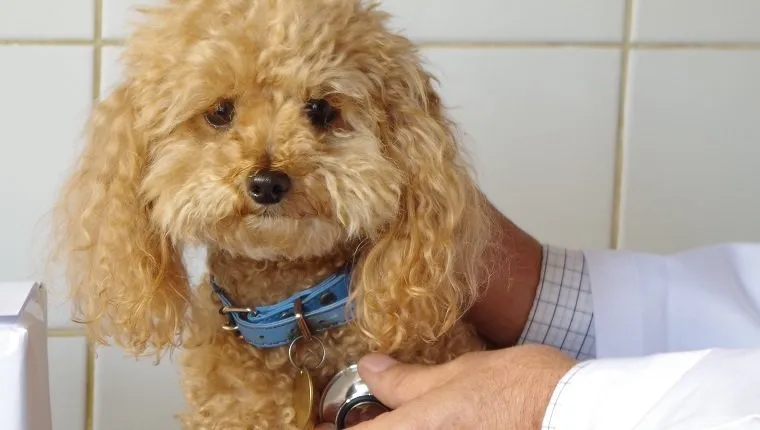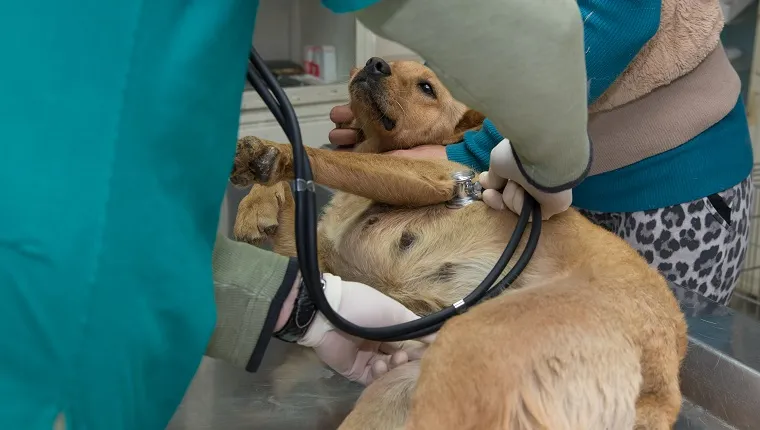Emphysema in dogs is a condition where air collects in the respiratory tract, making it difficult to breathe. This build-up of air is often caused by another chronic respiratory disease and results in dogs having a hard time expelling air from the lungs.
There are two main forms of emphysema in dogs. Alveolar emphysema happens when the alveoli, or air sacs in a dog’s lungs, get permanently enlarged. Interstitial emphysema happens when air collects in the connective tissue of the lungs.
The symptoms and causes of these two types may be similar, and your veterinarian will determine the best course of treatment if they diagnose your dog with the condition.
Here’s what you should know about the symptoms, causes, and treatments for emphysema in dogs.
Symptoms Of Emphysema In Dogs

Some dogs who have emphysema may show no symptoms at first, and when they do occur, they may appear or disappear suddenly. The type of symptoms you see in your dog may vary depending on which organs or tissue are affected by pressure from the build-up of air in the respiratory tract.
Here are some common symptoms you may see in dogs who have emphysema:
- Difficulty breathing or increased respiratory rate
- Coughing
- Intolerance to exercise
- Increased heart rate
- Loss of appetite and weight loss
- Lethargy
- Weakness
Causes Of Emphysema In Dogs

There are many possible causes of emphysema in dogs.
In humans, the main cause is exposure to airborne irritants such as cigarette smoke and air pollution. In dogs, however, the condition usually results from another lung illness, which often creates lesions that allow air to enter the alveoli, but prevent air from being released.
Here are a few possible causes of emphysema in dogs:
- Inflammatory lung disease such as chronic bronchitis or chronic obstructive pulmonary disease (COPD)
- Cancer
- Lung parasites
- An internal or skin wound that allows air to move into tissues due to movement of muscles
- Injury to the respiratory tract that causes ulcers or lacerations
- Congenital bronchial hypoplasia, a condition present at birth where airways aren’t developed, especially in Pekingese dogs
Treatments For Emphysema In Dogs

The goal of treatment for emphysema in dogs is to restore normal respiratory function and reduce any immediate symptoms. Dogs in severe distress may need to be hospitalized and put in an oxygen cage or given oxygen through a mask or nasal catheter.
If the airway is obstructed, then a vet may give the dog a bronchodilator, which is an anti-inflammatory drug that opens the airways. You may have seen patients with asthma inhalers use these drugs.
If symptoms don’t improve, then a vet may surgically place thoracostomy tubes into a dog’s chest, which provide suction and remove air accumulation. The vet may also need to perform surgery to remove damaged lung tissue. Most dogs recover well from the surgery.
During recovery, dogs need rest. Vets may recommend crate rest to restrict dogs’ physical activity.
Some dog parents manage their pets’ symptoms without surgery, though dogs who don’t have surgery often suffer from chronic respiratory issues. If your dog gets treatment for emphysema, then follow your vet’s instructions carefully so your dog can recover safely.
Has your dog suffered from emphysema? How did you treat it? Let us know in the comments below!









